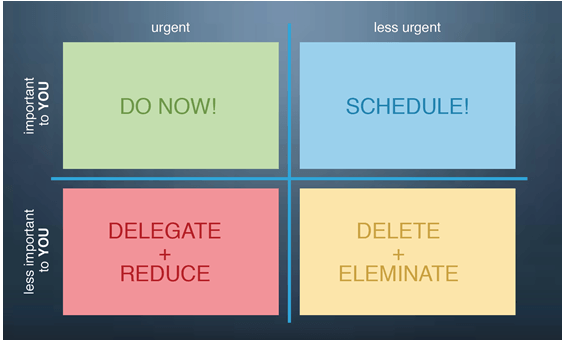There are two common problems that academics face when it comes to writing. They are linked by one thing: time. It is one of the most important resources when it comes to writing. We need time to reflect on our research and to think about the best way communicate it to our audience. During some phases of your career, you will need to fit writing around a range of other commitments and may feel that you simply do not have time. At other times, particularly when faced with long periods of research leave, you will have the opposite problem, too much time, making it difficult to focus.
This post is about the first problem. A second post, coming up on Wednesday, addresses the second.
Note – If you simply do not have any time and space to write because your teaching or administrative load is too great then take care of yourself first. You will not write well if you are stressed and tired. Don’t simply add writing to an already exhausting workload:
Writing when you have little time
Four steps to writing when you have little time:
- Make time
- Prioritise
- Allow time to plan
- Write smart
Find time
Think about the tasks that currently fill your days – what can be reduced or removed? Take a deep breath and be honest with yourself. What can you cut from your working day to allow time for writing?
- Only attend/arrange meetings when you really need to.
- Reduce as many meetings as you can from 1 hour to 30 mins and stick to the time.
- Ask yourself – am I the most appropriate person to be doing each task? Should anything be delegated?
- What doesn’t need to be done at all? Who would notice if you didn’t do ‘x’? Would you?
Remember if you are Pathway 1 or 2 then communicating your research and other forms of writing like writing funding applications are required by your job description so that’s a good reason to put it into your calendar (which then prevents meetings being booked into otherwise ‘free time’.
Don’t let email control you. Too many people treat it as a to-do list that anyone can add to at any time. Be decisive and keep your responses concise and clear. Run a ‘calm inbox‘ and only read from it in set ‘admin times’. Limit how long you spend on mail. Set a timer if you need to.
When you can, save your most productive periods of the day for writing. If you are best in the morning, don’t look at your e-mail until you have done at least 1 hour of writing and set meetings for the afternoon.
Practical bit:
- If you aren’t sure where to start, try putting your regular tasks into this helpful version of the Eisenhower Matrix created by our favourite local productivity guru, Helmut Hauser:
Prioritise
Once you have worked out what time you can dedicate to writing in the coming days/weeks/months, think about what writing you actually need to produce. If you are short on time, be efficient with what you choose to spend writing time on.
Funding: Reflect carefully on which funding you choose to apply for. Take advice from academic colleagues you trust, talk to colleagues in RED, get to know contacts at funding bodies where appropriate to help you understand what they are looking for and what you need to provide them with.
Publications: Be selective about which publications you choose. Communicate with editors early to ensure that they are interested in the piece of work you are proposing to do before you give it too much time. A quick e-mail with a concise paragraph or two outlining your idea is all it takes to check whether they would consider publishing your work and what changes you might need to make to make to your plans before you’ve started writing.
Practical bit:
- Make a list of everything you could use your writing time for and then number it in order of priority
Allow time to plan properly
When we are short on time it can be easy to panic and start writing too soon. Careful planning can make the writing process quicker and easier and much less painful, especially when you are busy. Think in advance about the order of your argument, planning the aims of each paragraph in advance. Try our ‘Quality Papers’ course for a great method of planning short and long written pieces.
Practical bit:
Brown’s 8 questions can be a great way to focus your thinking:
- Who are your intended readers? (3-5 names)
- What did you do? (50 words)
- Why did you do it? (50 words)
- What happened? (50 words)
- What do your results mean in theory? (50 words)
- What do your results mean in practice? (50 words)
- What is the key benefit for readers (25 words)
- What remains unresolved? (no word limit)
Write Smart
- Book the time. Once you have picked what must be written and decided how to allow some time for it, claim that time by blocking it out in your diary. If colleagues try to use it for meetings, gently remind them that writing time is an essential part of academic life and should never be side-lined.
- Get writing. Half and full days are best. Start each writing session by planning what you are going to do that session – don’t just start writing! If you need to get some writing done this week but don’t have a whole slot, create a day’s writing across the week. Plan it on Monday then give yourself 1-1.5 hours on Tuesday, Wednesday, Thursday and Friday to keep things moving. Its not always possible to write every day but write regularly to keep in practice and keep improving. Book onto our Regular, Productive Writing course to learn more.
- Plan each writing session. Think about how much writing you can manage in the time you have – write a few sentences specifying what content you will cover and how that will fit into the larger structure of the piece you are working on (if appropriate). This gives you focus for the day and stops you from getting distracted by your larger project.
- Eliminate distractions. Turn off your e-mail, switch off social media, put your phone on mute. Try to ignore that itchy feeling in your mind. Its easy to distract yourself when things get hard. Enjoy a deeper focus without distractions.
- Write with others. By agreeing writing time with others, its easier to feel compelled to use it properly. Invite a colleague or a small group of colleagues to write with you. Agree a place and a time and commit to being there. Attend one of our writers’ retreats to try a great structured approach to writing regularly and together.
- Take breaks. For every 1.5 hours you write, you should take a ½ hour break. Have a snack, go for a walk! Your brain needs time to rest properly and regularly when you are working it hard. Most of us don’t take breaks because we are afraid of losing our train of thought or momentum but it can be very damaging. A practical solution to this is to write a short summary of what you’ve written so far and what you want to tackle next before taking a break to help your brain rest properly and to help you get going again as quickly as possible.
- Find the right place. If you find you are interrupted too much in your office, write somewhere else. Or simply lock the door and unplug the phone during your writing periods – let them world back in for breaks and non-writing days.
Written for Bristol Clear’s WriteFest 2018 by Pam Lock
Three things to read if you want to know more:
- Cal Newport, Deep Work. Rules for Focused Success in a Distracted World (London: Piatkus, 2016)
- Rowena Murray and Mary Newton, ‘Writing retreat as structured intervention: margin or mainstream?’, Higher Eductation Research & Development 28:5 (October 2009) 541-554
- Maggie Berg, The Slow Professor: Challenging the Culture of Speed in the Academy (Toronto: University of Toronto Press, 2016)



